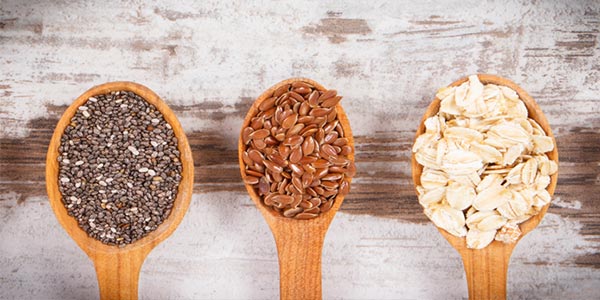Time and time again, we have heard people use the word ‘fiber’ when it comes to eating healthy.
[the_ad id=”6114″]
“Eat more fiber,” they say but why? This article will tell you why fiber is considered so important for a healthy and happy body. Let start with some basics.
What is fiber?
Fiber is made up of the portion of plant-based food that cannot be broken down completely by the digestive enzymes in our body. Fibers can be broken down into soluble and insoluble fiber.
- Soluble fiber: As the name suggests, soluble fiber dissolves in water. It forms a gel-like substance which slows down digestion and in order to allow us to soak more nutrients in the process.
- Insoluble fiber: Insoluble fiber does not dissolve itself in the body but travels through the body while bulking up food. It fastens up digestion and helps relieve digestion problems like constipation and irregular stools.
How much fiber does an adult need?
According to the Institute of Medicine, the daily fiber recommendations for adults are as follows:
- Men (19-50 years)- 38 grams (g) per day.
- Women (age 19-50 years)- 25 grams (g) per day.
Let’s move on to the benefits of including fiber-rich foods in your daily diet. A high-fiber diet has multiple benefits which include:
Regulates bowel movements: Fiber helps bulk up your stool which is relatively easy to pass. In case of constipation, fiber helps solidify the stools by adding bulk and absorbing water. In addition to that, it has been found that a high-fiber diet helps maintain bowel health and reduce the risk of hemorrhoids and colon-related problems.
Reduce the risk of type-2 diabetes: An analysis of 19 studies showed that people who consumed more than 26 grams of fiber every day were at an 18% reduced risk of diabetes in comparison to people who consumed minimum amounts of fiber. Fiber helps in keeping blood sugar levels steady which helps in keeping type- 2 diabetes at bay.
Detoxes the body: According to Tanya Zuckerbrot, R.D., author of The F-Factor Diet, “Soluble fiber soaks up potentially harmful compounds, such as excess estrogen and unhealthy fats, before they can be absorbed by the body.” Insoluble fiber speeds up the process of digestion which eliminates the harmful chemicals like BPA, mercury and pesticides from the body quickly.
Helps in managing weight: Fiber is bulky and takes more to chew. Therefore, it is naturally more filling than less-fiber foods and satisfies hunger for a longer time. Since fiber makes a person feel more full, he tends to consume fewer calories per day.
Increases life longevity: According to researchers at Harvard School of Public Health, people who consumed a fiber-rich diet were at an approximately 17-19% reduced risk of premature death from any cause whatsoever. Including fiber in your diet ensures a healthy body and an ideal lifestyle .
Some foods which are high in dietary fiber are:
- Whole grain food items
- Bran
- Legumes- Beans, Lentils, Peas
- Brown rice
- Fruits- bananas, strawberries, apples, mangoes, oranges,, raspberries.
- Vegetables- carrots, beet, broccoli
- Drinking plenty of water also helps as fiber works best when it absorbs water.
Note: Anything consumed in excess is harmful. That being said, overconsumption of fiber is known to cause problems like bloating, cramps and gas. It is recommended to consult a dietician and gradually increase the fiber intake in your diet and stick to the recommended fiber intake. Health is just an app away!
Source:

